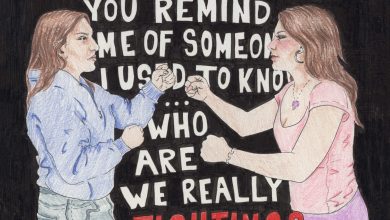GirlDefined, Biblical Womanhood, and the Woman’s Holy War

Design by Emma Lehman
In the early 1980s, the United States was undergoing a dramatic change to its political and religious landscape. Out from beneath the women’s liberation, religious liberalization and anti-war movements of the 1970s re-emerged American conservatism, with a new religious zeal. Political factions like the Christian Right and the Moral Majority embodied the right-wing pushback against perceived American secularization. Cults of personality centered around celebrity preachers and televangelists brought religious fundamentalism into mainstream consciousness. Self-identification with religion continued to grow in the United States populace until its peak in 1990, bringing with it the Moral Majority, Focus on the Family and a slew of other parachurch organizations, the reaches of which extended far beyond the churches whose oversight they shirked. It was against this backdrop that “Christianity for Her” emerged. Centered around the ideas of “biblical womanhood,” this particular brand of religion caters to women and girls in its message, aesthetics and ideals; it is the smaller-pink-earplugs version of Christian evangelism that carries with it a dangerous message.
The phenomenon of Christianity for Her is perhaps best described by Molly Worthen in her piece Housewives of God, where she refers to an amalgam of “traditional revivalism, modern therapeutic culture and the gabby intimacy of Oprah.” The subculture’s branding is unmistakable: their websites and books are a midwestern mom’s Pinterest fever dream, featuring endless variations of the same lowercase calligraphic font, watercolor florals and an aggressive overuse of millennial pink. These women’s ministry communities represent a broadly appealing Christianity –– they are young, hip and relatable girls who seem a palatable blend of empowered and deferent. Interestingly, GirlDefined never once mentions race or class in any book, video, or blog post. For a ministry that isn’t shy about embracing the word “radical” as a self-prescribed descriptor, and that has not been dissuaded by negative press, this omission doesn’t feel like an oversight. It’s a conspicuous exclusion, pointing to a blind spot in the community as a whole. Identity politics is essential to women’s ministries when it applies to gender, faith and their intersection. Beyond the identity of the “christian woman,” who is white- and middle-class-coded, however, GirlDefined and their counterparts are noticeably silent.
One of the more well-known women’s ministries is GirlDefined. Their moment of Internet fame came after YouTuber CodyKo’s video “THAT’S CRINGE: GirlDefined” amassed more than 15 million views. CodyKo describes GirlDefined as creators of “very brainwashed and sexist” Christian content that “talks about normal shit people do… And then [is] like, ‘but that’s a sin, and we’re gonna show you how to fucking not do that.’” Bethany Beal and Kristen Clark, the sisters behind GirlDefined, put their mission a little differently, asserting a desire to “help modern girls understand and live out God’s timeless truth for womanhood.” CodyKo’s description isn’t far off from how this mission manifests in their content, however. The vast majority of their videos, blog posts, and publications (inexplicably including not one but two coloring books) center upon shaming young girls out of their desires and curiosities.
After CodyKo’s video, a flurry of GirlDefined commentary videos began to appear, followed by a sequel from CodyKo himself. The bulk of these videos assumed that their audience would consider the ramblings of the GirlDefined sisters so ridiculous that they must be some kind of deadpan satire. For the most part, this was how the sisters’ content was read: Bethany Beal and Kristen Clark are known outside of their own circles chiefly as TikTok meme fodder. Their extreme views on virginity and videos like “Why We Waited Until Marriage To Kiss” receive comments mostly along the lines of “they definitely shower with their clothes on,” “weird flex but ok,” “I kissed my girlfriend during this video and it was great,” and my personal favorite: “next up, ‘why we waited until marriage to meet.’” But reading the comments on Bethany and Kristen’s blog posts and pre-viral-fame videos tells a different story –– one that shows how ministries of their kind pose a true danger to young women.
Beneath a blog post entitled “How to Deal with Secret Sexual Struggles,” one girl writes, “I’ve been struggling with masturbation for about a year. I’m incredibly ashamed of it, and wish I had never started. I feel impure and dirty, spiritually dead. Please pray for me. I want my heart to change.” On “Why Girls Aren’t Honest About Their Sexual Struggles,” one girl wonders if she can ever “regain her innocence” after having given in to “sexual sin.” Several comments come from queer girls racked with guilt over feelings of attraction to other women. Scrolling deeper and deeper into comments left by ashamed teens reminds me of the undercurrents of guilt in my own religious upbringing. The struggles of these girls echoes an inner philosophy I unwittingly and subconsciously developed throughout my childhood and adolescence of attending church and consuming Christian media. As a young teen, I internalized the idea that my value as a girl, and eventually as a woman, was and would be based on my usefulness, purity and ability to control myself.
The views espoused by GirlDefined, Mrs. Midwest, The Transformed Wife, and other women- and girl-specific ministries may seem to some a hilariously baffling offshoot of purity culture, so extreme and impractical and confusing that they absolutely must be satire. Certainly it does quell some of my latent religious guilt to laugh along with a 17-minute video that spends four of those minutes mocking Bethany Beal’s constant patronizing side smile. But for girls who stumble upon these ministries with a different mindset, the message espoused by GirlDefined can prey upon the guilt, shame and vulnerability they may be feeling.
Women’s ministries find a rapt and impressionable audience in plenty of young women who take their message as gospel, and who inevitably develop the shame and guilt inherent in doing so. In a culture very much invested in identity politics, the specific-to-girls message of women’s ministries is appealing, timely, and generates a fair amount of clicks. Some women are perhaps lulled in by an interest in learning how to better incorporate Christianity into their relationships, their career or their family. Others may be drawn by titles like “To the Girl Who is Discouraged and Losing Heart”; still others by a desire to learn what Christianity has to say about the “gentler sex.”
But converts into the fold will soon find that these ministries are not out to offer a woman’s perspective on faith, but rather to lull women into the false belief that their fulfillment is contingent upon a God-ordained path for their sex called biblical womanhood. In this community, there is one right way to Be a Woman. The woman who follows the right path is defined in opposition to other women who follow any number of incorrect paths, of which there are plenty. Career women, childless women, women in higher education and working women are pitied as those who are motivated by self-fulfillment, biblical womanhood’s cardinal sin.
The first image conjured by the phrase biblical womanhood is that of a medieval wife with hip-length hair, clad in a head covering, making her own pinafore on a hand-crank sewing machine (and that is certainly the approach that some have taken). Now, however, the identity has morphed into something much more insidious. No longer are biblical women required to remain silent in church, nor are they banished from the home when they’re menstruating. They are not useless accessories, in fact, they are incredibly useful. Their purpose is to be useful. They are distinctly different from men, but –– and this is stressed ad nauseam –– equal in value (the phrase “separate but equal” raises no historical red flags, apparently). The biblical woman is important, crucial even, to the smooth operation of a perfectly biblical world.
It bears repeating, because women’s ministries love this talking point –– not only are women and men equal, but women may even be more important to the functioning of society than their male counterparts. Women are imperative to a harmonious society! Women’s ministries of today love to proclaim that neither the Bible nor their interpretation of it devalues or debases women; in fact, women are the backbone of the ideal society.
And this is true. Biblical womanhood isn’t a devaluation of women, but it is a conditional valuation –– a woman is valuable when she is useful to others. At the heart of this philosophy is the idea that a woman finds fulfillment through servitude –– to her husband, to her children, to her community, and ultimately to God. Mantras bandied about in women’s ministries like “behind every great man is an even greater woman,” or “the hand that rocks the cradle is the hand that rules the world” reveal an assessment of women’s value based on her usefulness. Nowhere is this more obvious than in the “three pillars” of biblical womanhood that GirlDefined sets forth in their eponymous book:
1. She helps others.
2. She produces life.
3. She nurtures relationships.
Each pillar positions the woman as a tool through which others become successful. Her physical labor helps others reach their goals, her emotional labor upholds and mends the relationships others have with her, and her body brings others into the world. In the physical body and emotional labor of a woman, God finds a tool for the creation of the ideal society.
Though they lay out these three pillars, Bethany and Kristen stress that there is no “cookie cutter” mold by which one must fulfill their biblical womanhood: there are plenty of ways that a woman can use her time, labor and skills to uplift others. If she is educated, she can “use her occupational training to bless . . . others.” If she “doesn’t have a husband to help yet,” she can help her father. If she doesn’t have children yet, she can help other women with theirs. No matter what “season of life” a woman is in, she can live to please Him through earthly servitude.
Absent from the three pillars and the doctrine as a whole is the acknowledgement of the woman’s needs as an individual. Striving for fulfillment through constantly meeting the needs of others with no credit completely abandons any hope of personal fulfillment.
Indeed, abandonment of the self is a crucial step in attaining perfect biblical womanhood. GirlDefined reminds us that the purpose of a woman’s work is “centered around being a . . . wife, mother, homemaker, and helper for her family.” A woman’s work must be selfless. She must acknowledge that “her work wasn’t about her. It wasn’t about her career. It wasn’t about her independence.” It’s important that the biblical woman is hardworking, but it’s even more important that she works hard for others. Girls, avoid selfishness at any cost, GirlDefined warns. A “self-focused” motivation is, for women, the cardinal sin. To struggle for others is righteous, but to struggle for herself is sinful, prideful and selfish. To be responsible for uplifting her husband is righteous, but to uplift herself is a sin.
Search for the self is not for women.
Women are God’s –– and the world’s –– tools, placed here to uplift, to help, to serve. GirlDefined writes that once a woman chooses to pursue biblical womanhood, her life’s purpose must transform. Her existence is “no longer about pleasing herself; it’s about living to please God.” Abandonment of the self may be biblical, but it certainly will not give women “lasting worth” as Kristen promises. Self-denial is not virtuous, it is only that: denial. Serving others at our own expense teaches us that we are only worth what we can provide to others, robbing us of any sense of accomplishment or pleasure rooted in fulfilling our own desires. Biblical womanhood positions us as modern-day Atlases, holding the world on our backs.
Among the responsibilities placed upon the biblical woman is an exhausting emotional vigilance in every area of her life. GirlDefined urges girls to be on the lookout for the enemy lurking within. A common thread throughout women’s ministries is the idea that life as a biblical woman is a constant battle, an everlasting struggle for self-control, for successful self-denial. Bethany and Kristen write in their book that Christian women must live “alert, watchful and ready,” as “the moment we let our guard down is the moment the enemy, Satan, will strike.” The “enemy” could be a woman’s selfishness in wishing to pursue a career instead of raising a family or community, it could be a woman’s desire to express her confidence through revealing clothing, it could be a woman’s desire to express “negative” emotions to a friend or family member.
It is through this philosophy that women and girls are taught that the world, the secular culture, even their own innate emotions and desires, are evils against which they must constantly battle. Emotions like love, desire, pride, even sadness and anger are not for the biblical woman. She must battle her “prideful, selfish heart” in a constant cycle of guilt and conscious suppression that renders her righteous and Godly. In biblical womanhood, strength comes from self-denial. GirlDefined quotes The Feminist Mistake author Mary Kassian, describing women who fail to implement this difficult and painful aspect of biblical womanhood as “wimpy women.”
This internal holy war is a righteous struggle. The truly biblical woman is in a constant state of suffering –– she is battling enemies that come not only from the world outside of herself, but from within her own sinful spirit.
After having matured and found both physical and emotional distance from the ideologies of biblical womanhood, I still find remnants of the philosophy in my own self-perception. The fear I felt as a young Christian girl was that I would allow myself to feel, that I would allow myself to give into the sinful desires or selfish emotions that made my brain human. I feared what I could not control, both from the world and within myself. I pitied those who were less virtuous than I, but even more than that I feared becoming like them –– those worldly girls who sought what they selfishly desired.
It’s exhausting, to fear both the outside world and your own instinct.
At first I was ashamed that I had to work at the self-restraint supposedly inherent in a biblical woman; then I was ashamed that I even had emotions and desires to restrain. I didn’t realize it at the time, but what I feared was that if I wasn’t strong enough to tamp down selfishness and desire for fulfillment, I was weak-willed… I was Mary Kassian’s “wimpy woman.” I didn’t want to be the “kind of girl” who wore a tank top to school or who thought about boys or who was loud or who spoke up when she was dissatisfied. I didn’t want to be the “kind of girl” who sought out self-fulfillment or who spoke her mind or who allowed herself selfish pursuits. Like many other young girls who may stumble upon GirlDefined or their counterparts, I bought into the lie that I could find fulfillment in servitude to those around me.
I believed that I could build for others what I wanted for myself, and in that way sanitize my selfish desires by routing them through my friends, community, and family.
Biblical womanhood places an enormous responsibility on women and girls to carry the world on our backs, promising that shouldering this burden will fulfill us. And how could we not feel accomplished, standing back and looking at what we have built? If we follow the three pillars, we will have a successful husband, a happy family, and a thriving community, and we will have built it. At the end of the day, is the biblical woman not the most virtuous, important, useful woman? Her body brings aid to her friends, happiness to her husband and life to the world. Self-sacrifice is romantic indeed –– by fighting the self and surrendering to servitude, we will find that our purpose in the world is for the world: after all, GirlDefined reminds us that “Eve was created for someone.” She was made second as a helper to Adam.
If we tamp down our sinful desires with enough vigor, if we tell ourselves often enough that want is selfish and selfish is sin, if we give enough of ourselves to others, then surely the success we created for them will fulfill us. If we use our work and our bodies and our love for others, then maybe we will one day stop feeling that itch deep inside us that demands we do something for no reason other than to feel accomplished in ourselves. After all, for women, fulfillment “isn’t built on self, but, rather, on a foundation of sacrifice.” To become fulfilled in biblical womanhood, there is only to serve, and serve, and serve, until finally “the beast” of self-focusedness will “fade into the background.” When we finally have a moment to sit up and mop our brow, we will see that we have found “true beauty, lasting security, gratitude, and confidence.”




